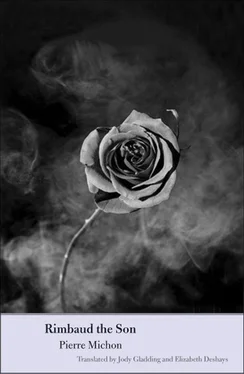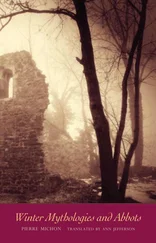3. NEITHER WAS IT WITHIN BANVILLE’S DOMAIN
Neither was it within Banville’s domain.
He too appears in this story, not long after Izambard, because we know that the adolescent sent him verses, care of the publisher Lemerre, into which he had put his whole heart; and the first, no doubt, that he considered presentable to an established poet. The triumphs of Awards Day were no longer enough for him; they had served their purpose; they had nurtured in that angry heart a brutal ambition at the same time as was born there that uncertain faculty, pose or task or revelation from On High, or a bit of all three, that was called genius in those times, that almost supernatural attribute that never appears itself, overhead or in the living visible body, as halo, vigor, beauty, or youth, but that nevertheless appears in minute effects and which is confirmed in the perfection of bits of coded language more or less lengthy written in black and white. We know that these bits are generally infinitesimal. We who read them never know if they are perfect or if it was whispered to us in childhood that they were perfect, and we in turn whisper it to others, ad infinitum; and the one who writes them does not know any more than we do, if anything less, he knows it only at the moment when he joins the rods, when fitting together flawlessly like mortise and tenon they briefly exult, closing with the triumphant sound of jaws, and it is over; and when it is over once again he trembles, that is him, the poet, in those jaws, the rod has deserted him there and he no longer knows how to write, even if he, like Field Marshal Hugo, had laid out rod upon rod until he died, even if he himself were the jubilant jaws of the shark and verse in person . Thus he trembles at his desk like a rat; but when he goes out he wants some kind of halo to appear over his head, and he wants to be told so: for he cannot see it himself. And to return to Rimbaud’s genius, to that most precise and furious ambition in the heart of the Ardennes in the scrap of a sulky man who was also and at the same time pure love — because all that is mixed together, byzantine and multiple as the old theology — to return to the one who is like the emblem for that conflict, that byzantine knot, we do not know if ambition precedes or foments genius, engenders it by strength of toil, or if, on the contrary, by pure miracle unfurling its wings, genius only afterward becomes aware of the shadow they cast and the men who rush into this mirage, and from then on, he who is the plaything of that phantom attribute and projects that shadow becomes infatuated with it, wants ever more of it, damns himself.
No, we do not know if it is pure or impure. We do not know if at the beginning there is the Word or the stack of ribboned books that, with little ceremonies, a subprefect in full uniform on a raised platform delivers into your hands. But, born of the Word, which since the beginning whispers where it will and has no residence, not Charleville, Patmos, or Guernsey, or born very locally of awards in excellence acclaimed in a local school auditorium in July with potted plants and flags, there is genius , since the word is in the language; since we use this abuse of language; and no doubt it does not exist, but the poets of that time wanted to be rewarded with that which did not exist: the older ones wanted to be reassured continually by honorary chairs under the dome of the Academy, by crowds taking off their hats to them, and when through misfortune they were without an audience in Guernsey, they summoned out of the air Shakespeare, Mozart, Virgil, who in fatherly fashion rushed over the sea to reassure them, with all the little hands of the sea clapping — and in heavy weather the big hands: and the Old Man on his gray island leaning over his séance table was at the opening night of Hernani with the red waistcoat, exiled he heard the audience of Hernani . And the young ones waited for the old ones out of courtesy and reciprocity, perhaps belief mitigated by augury between them, a great fear of augury suspended between men and gods, who are both fearsome, the young ones waited for the recognized poets, that is, the ones whose names had at least once in some context brushed up against the word genius , for those poets to grant them a small ray from that invisible halo that they were reputed to have over their heads; and which is transmitted as if by cuttings, from the oldest to the youngest, but that the young can never quite steal, not even Rimbaud or Saint John, the old must proffer it: and it was of Banville that Rimbaud asked that immense small favor.
We no longer hear of Banville, he too pissed into the wind; and he did not even enjoy the combined benefits of mystery and failure, of the loss of being, that Izambard’s shade enjoyed. If we go by the anthology pieces (since no one bothers to read the complete versions anymore, except perhaps some old auto-didact, a Léautaud from Douai or Confolens who, leaving the library, curses the Walkmen and the motorbikes, or more optimistically, a very young country girl who climbed up to the attic in June, when school is closed and the heart wide open to the infinite freedom of objectless loves, and in the attic she found among old dresses Les Cariatides by Théodore de Banville, an old book of poems that she reads alone under the linden tree until dark), if we can go by those pieces, always the same ones, which must indeed be the best of them but which seem so poor, Banville was not a brilliant poet — at least he no longer seems so to us — and yet in his lifetime he seemed so: someone is mistaken in this matter, Baudelaire or you, me or Sainte-Beuve, Rimbaud or the descendants of Rimbaud, who knows? men of letters are futile. We have not read his verses, except for those eternal trifles from selected pieces with their Bacchuses that in the corner of the woods our grandmothers might take for slightly tipsy grandsons, and their violet-eyed erect young Athenian girls, pretty in their way, but with so little ass under their tunics. We have not read him. But we know, because we have read about him, that he too was prodigiously precocious, from his infancy possessed great ambition and pure love, the seven-league boots, came from Moulins as Bonaparte from Ajaccio and Rimbaud from Charleville with a strong will to be done with old-fashioned poetry, and proudly launched those Cariatides in Paris, which, says Baudelaire, no one would believe a young fellow of eighteen to have written. Yes, we know that Baudelaire held him in high esteem and was his friend, that he set him apart as he did Chateaubriand and Flaubert, above the modern riffraff as he put it, which perhaps distinguishes him, unless it was polite augury; we know that for a long time he slept with the fat Marie Daubrun, whom Baudelaire so desired; that they had a falling out over her and that much later the munificent Banville, a decent man, sent a petition to the minister so that the poor human wreck of Brussels could draw a pension, have his clothes brushed, his old man’s food brought to his imbecile mouth by an almost friendly hand, perhaps glimpse a skirt, chant his crénom without a thought for tomorrow. And that distinguishes him. Furthermore, from Gide’s slander we know that the affability of his criticism was such that, reading it, one would think one was eating jam; from Doctor Mondor we know that he highly prized and revived the little forms fallen into female hands: the rondeau, double rondeau, lay, virelay, villanelle, chant royal; from Mallarmé that he was not somebody special, but the very sound of the lyre; and that this somebody who was in the end nobody, as a good bourgeois, as a good poet, loved to walk in the Luxembourg Gardens dear to the passerby , and from there under the leaves certainly eyed the dome of the Pantheon close by, believing, not believing, that he had laid enough rods two by two to be laid himself in return one day there below in the shade of the vault that is to the great dead what the June leaves are to the passersby; and of course that is also why, because of that finally modest ambition, he was not Rimbaud; but that is not the only reason. We also know about his voice, from Antonin Proust, who heard it, from the time when it rang forth into the day: it was musical, lilting, a bit high and fluty, like Mallarmé’s; in that high-perched voice he liked to proclaim: I am a lyric poet and make my living from it —and we can well imagine all of that together, the fluty voice, the bland affirmation, half sincere, half silly, and beneath it all a bit of specious ferocity, the Louis-Philippardian stroll to the Luxembourg, gaze drawn toward the dome: Banville is a type that we have all encountered a hundred times. Finally, from Verlaine we have the precious knowledge that he strikingly resembled Watteau’s Gilles, so that he could have been taken for him had this Gilles happened to be strolling in Paris — that he thus resembled Charles Carreau, parish priest of Nogent-sur-Marne and Watteau’s model, and there was no danger of mistaking them for one another because, since 1721, the model no longer set foot in the Luxembourg or anywhere else, and was under the marly earth of the Marne. Banville had the Gilles’s reddened nose and his dazed look of a boy about to cry, perhaps his very old soul; and the silver chlorides, obediently reproducing as is their custom, photo after photo perfectly identical in the way of amoebas, in my case perfectly reproduced on page 39 of the Rimbaud iconography that lies open before me, the silver chlorides are in agreement with Verlaine on this point.
Читать дальше












